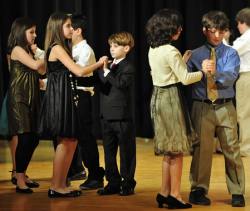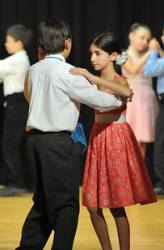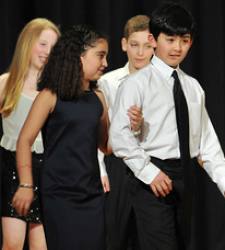Students Raise Funds for Japan
- Details
- Hits: 4985
 On March 23, Edgemont High School’s Cultural Exchange Club hosted a bake sale to raise money to donate to the survivors of Japan’s recent disaster. Volunteer bakers provided about three hundred rice-balls (onigri), batches of brownies, cookies and other goods for sale. Students and faculty members crowded around the club’s bake sale, eager to make purchases. Every item was sold for just a dollar, and the club raised a grand total of about $730.
On March 23, Edgemont High School’s Cultural Exchange Club hosted a bake sale to raise money to donate to the survivors of Japan’s recent disaster. Volunteer bakers provided about three hundred rice-balls (onigri), batches of brownies, cookies and other goods for sale. Students and faculty members crowded around the club’s bake sale, eager to make purchases. Every item was sold for just a dollar, and the club raised a grand total of about $730.
Edgemont Senior Kozue Iwasaki, who was the inspiration behind the bake sale, had the idea to form a fundraiser: “Many of my friends who are living in Japan right now have been updating their Facebook statuses, saying that they have no electricity in certain areas and are lacking simple things such as toilet paper. Even though my friends live in Tokyo where they weren’t as drastically affected by the disaster, they still experienced much of the same as those who are in Sendai.”
It seems like the citizens of every city in Japan got affected in some way or the other by the earthquake or tsunami. “My aunt was stuck in  a car for thirteen hours on the roads because of the earthquake,” said Kozue about her family members experiencing the earthquake. Ally Martin, a junior who is part of the club added that, “[her] friends who live in Kawasaki, which is close to Tokyo, were trapped in their school for three days straight. They couldn’t reply to my emails and I went to school worried each day thinking that something had happened to them.”
a car for thirteen hours on the roads because of the earthquake,” said Kozue about her family members experiencing the earthquake. Ally Martin, a junior who is part of the club added that, “[her] friends who live in Kawasaki, which is close to Tokyo, were trapped in their school for three days straight. They couldn’t reply to my emails and I went to school worried each day thinking that something had happened to them.”
Ally has already made a contribution to help Japan: “I’ve donated three hundred dollars to the Red Cross already with my family and I’m probably going to raise more for charities. The amount of money we made today was a lot more than I think anyone expected. People were extremely generous towards making donations. Some students just donated money without even taking any of the pastries.” In addition to the club’s efforts, community members are supporting Japan in many ways. The eighth graders at Edgemont are holding a coin collection soon while the Edgemont-Aid, Builder’s Club and the student body is planning on holding fundraisers as well. All of the proceeds made by the bake sale are going to be donated to an organization called the Japan Society which will help provide necessities for those suffering from the aftermath of the disaster.
 Submitted by Tiffany Jiang
Submitted by Tiffany Jiang
Tiffany Jiang is a freshmen at Edgemont Jr./Sr. High School and a photographer for the school's newsletter. She is interested in writing, photography and multimedia.
Quaker Ridge First Graders Take Initiative
It all started during recess. A group of Quaker Ridge first grade girls were discussing the horrible disaster in Japan—the visual images, the plight of the people, and the tremendous devastation and destruction. The girls decided that they had to get involved. They would create their own charity.
The first grade girls are Samantha Friedland, Juliette Silk, Julia Schnipper, Chloe Wise, Julia Raskin and Nicole Cohn. By the end of recess, they had a name, logo, plan, and of course… a handshake. They were “Friends For Change”. They took the logo to one of the mothers who designs clothes and created t-shirts.
“Friends For Change” had its first event on Friday, March 18. The group created posters, baked cookies, popped popcorn and made  lemonade. They raised $442 at that event alone and to date have raised $1,200! The Girl Scout Organization heard about their efforts, endorsed the group, and pledged assistance as well. More events have been discussed. All proceeds are going directly to the relief effort in Japan. Congratulations to these little kids with big ideas!
lemonade. They raised $442 at that event alone and to date have raised $1,200! The Girl Scout Organization heard about their efforts, endorsed the group, and pledged assistance as well. More events have been discussed. All proceeds are going directly to the relief effort in Japan. Congratulations to these little kids with big ideas!
Who said that recess was all play?
Submitted by Rhonda Schnipper
Ballroom Dancing at Heathcote Elementary
- Details
- Hits: 4400
 The fifth graders at Heathcote participated in Dancing Classrooms, a project of the American Ballroom Theater Company, Inc. Over a 10-week period, the students learned six social dances (foxtrot, merengue, rumba, tango, swing and waltz.) The program also aims to build social awareness, confidence and self-esteem. The ballroom dancing program was funded by the Heathcote PTA. – Text courtesy of Fifth Grade Teacher Lisa Onofri and picture from Jon Thaler. See more photos at JonThaler.com .
The fifth graders at Heathcote participated in Dancing Classrooms, a project of the American Ballroom Theater Company, Inc. Over a 10-week period, the students learned six social dances (foxtrot, merengue, rumba, tango, swing and waltz.) The program also aims to build social awareness, confidence and self-esteem. The ballroom dancing program was funded by the Heathcote PTA. – Text courtesy of Fifth Grade Teacher Lisa Onofri and picture from Jon Thaler. See more photos at JonThaler.com .




Fourth Graders Save Endangered Species
- Details
- Hits: 5447
 Right now, the Wildlife Conservation Society (WCS) conservationists are working on the ground, across four continents and five oceans, to save some of earth's most spectacular and imperiled wildlife. From Thailand’s tiger territory to the nesting beaches of leatherback turtles in Gabon, and from the steamy South American jungles of the jaguar to the elephants and gorillas of the African forests, WCS is making groundbreaking discoveries and crucial progress against great odds.
Right now, the Wildlife Conservation Society (WCS) conservationists are working on the ground, across four continents and five oceans, to save some of earth's most spectacular and imperiled wildlife. From Thailand’s tiger territory to the nesting beaches of leatherback turtles in Gabon, and from the steamy South American jungles of the jaguar to the elephants and gorillas of the African forests, WCS is making groundbreaking discoveries and crucial progress against great odds.
In order to continue the important work of saving the wild animals and wild places, Greenacres 4th grade students in Mrs. McDermott’s and Mrs. Cooper’s classes embarked on an endangered species project to help. Specifically, each fourth grade student selected an endangered animal to study and then conducted research.
From their learnings, keynote presentations were developed about the animals. As part of the project, the eager students created pins, magnets, bookmarks and many more items to sell. All of the students’ parents attended the presentations and bought the handcrafted items. Close to $700 was collected from the sale of these items and donated to the Wildlife Conservation Society.
The students learned so much about these adorable animals and had a wonderful experience. Mrs. Cooper  started this program nine years ago at Greenacres and it is our hope that the tradition will continue for many years to come.
started this program nine years ago at Greenacres and it is our hope that the tradition will continue for many years to come.
If you would like to make a donation to the endangered species, please use the address below:
Wildlife Conservation Society
Attn: Donation Services
2300 Southern Blvd.
Bronx, NY 10460
Babar to be Featured at Children's Concert
- Details
- Hits: 3888
 The Hoff-Barthelson Music School will feature a special Children’s Corner Concert at the Music School, 25 School Lane, Scarsdale on Friday, March 18 at 6:30 pm. L’Histoire de Babar, le Petit Éléphant (Babar the Elephant) by Francis Poulenc will be performed by pianist Gena Raps and narrated by Ronald Spivak. La Cheminée du Roi René by Darius Milhaud will be played by faculty artists Joseph Piscitelli, flute; Elizabeth Condon, oboe; Dorothy Duncan, clarinet ; Karen Froehlich, horn and Janet Grice, bassoon. La Cheminée is a woodwind suite in seven movements that recounts 15th century King Rene’s daily rituals: a procession, hunting, the entertainment of jugglers, and jousting on the River Arc.
The Hoff-Barthelson Music School will feature a special Children’s Corner Concert at the Music School, 25 School Lane, Scarsdale on Friday, March 18 at 6:30 pm. L’Histoire de Babar, le Petit Éléphant (Babar the Elephant) by Francis Poulenc will be performed by pianist Gena Raps and narrated by Ronald Spivak. La Cheminée du Roi René by Darius Milhaud will be played by faculty artists Joseph Piscitelli, flute; Elizabeth Condon, oboe; Dorothy Duncan, clarinet ; Karen Froehlich, horn and Janet Grice, bassoon. La Cheminée is a woodwind suite in seven movements that recounts 15th century King Rene’s daily rituals: a procession, hunting, the entertainment of jugglers, and jousting on the River Arc.
As part of the L’Histoire de Babar, le Petit Éléphant performance, the Hoff-Barthelson Preschool’s Recycled Materials Art Project will be on display. Each year the 3 and 4-year-olds in the HBMS Preschool listen to and hear the story of a particular piece of music - Vivaldi’s Four Seasons, Saint-Saens’ Carnival of the Animals, and Prokofiev’s Peter and the Wolf in past years - and then build a 3D representation of that piece from a wide assortment of recycled materials. This year Babar the Elephant has been rendered in brilliant colors from paper tubing, feathers, string, twine, egg crates, cardboard and the like! Currently on display in the Children’s Library at the Scarsdale Library, the entire project will be reassembled for display at the March 18 performance.
Not recommended for children under 3, tickets are $12 for ages 3-12, $18 for 13 – adult, and $6 for Hoff-Barthelson students under 18. For information about this event call 914-723-1169 of email [email protected].
Battle Hymn of the Mouse Mother
- Details
- Hits: 6336
 Here is a parody of Amy Chua’s Battle Hymn of the Tiger Mother by Scarsdale's Julie Gerstenblatt: A lot of people wonder how it is that Jewish parents raise such stereotypically successful kids. They wonder what these parents do to produce so many doctors and lawyers, so many rabbis and Hollywood producers, one Itzhak Perlman and the occasional Madoff. They want to know what it’s like inside the suburban minivan of a Mouse mother’s world, to see whether they, too, could drive a perfectly normal child into years of psychotherapy.
Here is a parody of Amy Chua’s Battle Hymn of the Tiger Mother by Scarsdale's Julie Gerstenblatt: A lot of people wonder how it is that Jewish parents raise such stereotypically successful kids. They wonder what these parents do to produce so many doctors and lawyers, so many rabbis and Hollywood producers, one Itzhak Perlman and the occasional Madoff. They want to know what it’s like inside the suburban minivan of a Mouse mother’s world, to see whether they, too, could drive a perfectly normal child into years of psychotherapy.
Well, I am here to say that they can, because I am doing it.
People see me out with my daughter in public and comment at how well behaved I am, even as she is brow-beating me and publicly humiliating me. So many people wonder why, when my children call me stupid, I am able to remain calm and not smack them upside the head. They say, Mouse mother, how can I emit calm like you, even while raising independently-spirited, self-directed, emotionally strong children? How is it that your children are bright even though you got a D in 8th grade Latin and attended a college known more for its fraternity system than for academic rigor? Mouse mother, please, they beg, tell us your secrets. And so, after generations of protected silence, I am here to squeal the truth.
With a little practice, you, too, can be a Mouse mother like me.
Not sure why you’d want to, but that’s for another memoir with a high six-figure advance entirely.
Anyway! Back to my battle hymn, which is really much more of a whine.
Anyone can be a Mouse mother; you need not be Jewish to lack Tiger skills. So, please understand that for legal purposes, I’m using the term “Jewish mother” loosely. So loosely, in fact, that when I say “Jewish Mother,” I mean absolutely anyone except for Amy Chua.
Here are the things that I, as a liberal Jewish mother have allowed my children to do and/or done for them:
- Skip 2 months of Hebrew school in order to perform in a local performance of The Nutcracker
- Bribe them to play piano, practice the violin, make their beds, brush their teeth, and to be nice to me and others – oh, what the heck, let’s just say “bribe them constantly” and leave it at that
- Talk them out of playing any and all contact sports for fear of them breaking their noses
- Talk them out of playing any sports that involve running because of the funny way they run
- Allow them to watch no less than 2 hours of television a day and to not let them stop until they had both committed to memory a complete episode of iCarly
- Suck their thumb until the age of 7 and/or carry around a dirty, beloved shmatte like Linus from The Peanuts
- Write notes to a teacher excusing their inability to do homework because American Idol was on
- Choose all their own extracurricular activities, including fencing, Lego robotics, and a class in which my 5-year-old daughter was taught how to sing karaoke like a drunken idiot at a bar.
Now I know some of these seem unconventional, but if your goal is to have a human child like mine, as opposed to an automaton, for example, then you’d do well by following my example of mediocrity and a little dose of who-gives-a-hoot.
To prove that this type of parenting can achieve the desired results, I would now like to share a few success stories.
A Tiger mother might spend two complete chapters of her memoir explaining how to get one’s children to perform at Carnegie Hall, or at the very least, how to obtain an audition to the Pre-College program at Julliard. But a Jewish mother can boil the answer to that down for you in a few simple words: by kicking and screaming. As a Mouse mother, I prefer to regale you with impressive stories of just the opposite, and so I shall call this instructional section of my writing “How To Ensure That Your Child Never Achieves Much of Anything in The Arts.”
I recently took my daughter, Zoe, for a trial class at a ballet studio where some of her friends were enrolled. After the class, we discussed what she thought about it and tried to decide together whether or not she would be signing up. Being a Mouse mother, I didn’t really care either way. The signature move of the Mouse mother is the shrug, which I did repeatedly as we spoke. I wrote down our conversation verbatim because I thought it was so emblematic of our mother-child dynamic.
Me: So, what did you think of this ballet class?
Zoe: I didn’t see any machines there.
Me: Huh?
Zoe: You remember that place where Andrew took a class once? They had candy and drink machines.
Me: Oh.
Zoe: And ice cream. We used to eat ice cream before his class.
Me: You mean, that hip-hop class on Central Avenue?
Zoe: Yes! And they had stuffed animals to buy and also dance clothes. And a TV to watch.
Me: Uh-huh.
Zoe: That’s the kind of dance class I want to take.
It’s clear to any Jewish mother out there that this girl understands her culture. Zoe knows that professional ballet is just not in her future, so why even try? How smart of her to know that, come puberty, her Polish genes will betray her, ensuring a body so low to the ground that it’s better constructed for potato farming than arabesquing. The closest she will ever come to doing a split is with her Barbie doll’s legs. And that’s so totally cool with her, as long as she can buy stuff and enjoy snacks.
It was one of the proudest moments of my life.
My firstborn, Andrew, proved to be another story entirely. He actually seemed to have some drive beyond the candy-and-shopping aspects of the theater. In fact, he tried out for and was given the coveted role of Fritz in last winter’s production of The Nutcracker at SUNY Purchase. Now, a Tiger mother would have spent weeks, days, and hours preparing her child for such an audition and would then feign modesty and humility but secretly take credit for the child’s success when he did well. But not me. I merely got Andrew a nice haircut and told him to smile a lot in front of the choreographers. Like the Mouse mother I am, I believe a nice Jewish boy with dimples can get ahead in this world merely by knowing his left from his right and by following his own interests.
Seeing that her child has a passion and talent for something of worth, a Tiger mother would certainly push and squeeze and prod and threaten to the point that a) the child got really freaking amazing at the skill and b) the child really hated both the activity and the Tiger mother. Where a Tiger mother values perfection, a Mouse mother values diversification above all else. Why stick to just one thing and become the best at it when you can try so many fun activities and be mediocre at all of them? Which is why, once Nutcracker season had passed, I did not take Andrew to The New York City Ballet. Instead, I took him straight to rec basketball.
Call me naïve, but so far, this renegade technique really seems to be working. And by “working,” I mean its produced children who, at the ages of 8 and 5, are pretty happy doing their job…of being kids.
Columnist and blogger Julie Gerstenblatt writes with humor and candor about her life in Scarsdale, her friends and family, and the particular demands of motherhood and wifedom in modern-day suburbia.







